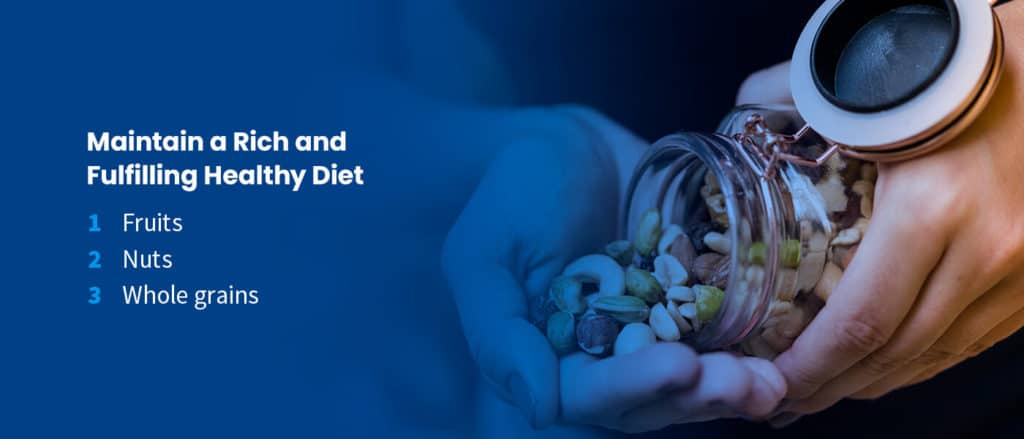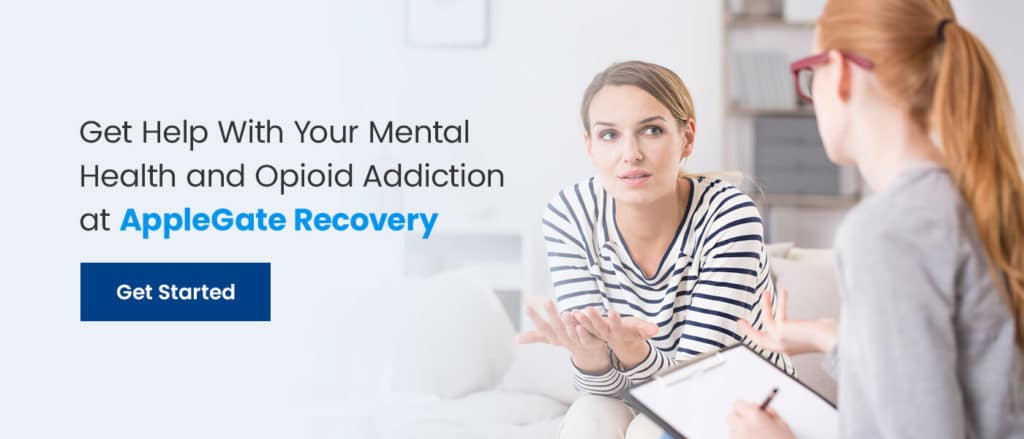Do you feel like some days your mind is telling you what to do and dictating how you feel? Do you struggle to escape from its grasp and do what you want to do? You’re not alone. One in four Americans struggle with mental health and are looking for ways to manage and cope. If you aren’t sure where to start, our experts at AppleGate Recovery can provide the information you need about mental health and addiction, along with resources for your mental health recovery.
Correlation Between Mental Health and Opioid Addiction
People who have an opioid addiction often have a mental health condition as well. Some common mental health conditions that coincide with opioid use include depression, anxiety, post-traumatic stress disorder (PTSD), and suicidal ideation. However, please remember that this is not an exhaustive list and other mental health disorders are correlated with addiction.
Sometimes, the mental health disorder comes before the addiction. A person may be feeling lonely, dealing with the stress of past traumatic events, or worrying about tension between their team at work. These overwhelming feelings can lead a person to seek any solution, not necessarily the best one. They may turn to drugs to cope and develop an addiction.
Other times, the mental health disorder presents itself after a person starts using opioids. Opioid misuse can lead people to struggle with their mental health in several ways, such as abandoning responsibility, making poor decisions, feeling physically agitated, and experiencing lowered motivation. These behaviors can easily lead someone to struggle with depression and anxiety.
What to Do When You’re Struggling With Mental Health
People with mental health conditions can lose hope easily. If you are struggling with your mental health, you can start on the road to recovery by acknowledging that you have a mental health disorder and need help. It seems like a simple step, but it is actually one of the most significant leaps a person can make. Once you have recognized your struggle with mental health, you can reach out to your doctors, counselors, recovery centers, and other health resources to get the help you need.
But once you’ve done that, what’s next? You can do many things to help yourself and improve your mental health. Here are some mental health best practices to try.

Maintain a Rich and Fulfilling Healthy Diet
You don’t need to follow the latest fad diet or count calories to maintain a diet that supports your mental health. Just eat a well-rounded diet and include healthy foods. A few items you’ll want to be sure to include in your daily meals include:
- Fruits: By adding fruit to your diet, you’ll increase your consumption of vitamins, minerals and fiber, all of which support your mental health.
- Nuts: Nuts, especially walnuts, can boost your optimism, concentration, motivation and hope with great omega-3 stores.
- Whole grains: Eating whole grains can help balance serotonin levels. Serotonin is the “feel-good” chemical in our body that helps maintain mental stability.
Other vitamin- and mineral-rich foods you’ll want to include in your diet are:
- Coffee
- Eggs
- Green tea
- Oats
- Olive oil
- Organic meat
- Sweet potatoes
Starting Your Day With Gratitude
Many gratitude journals are available to guide you through acknowledging what you are grateful for, but you can just as easily write on a blank piece of paper or in a standard notebook if you wish. Taking time to reflect on the good in your life brings positivity to the forefront of your mind and pushes more negative thoughts to the back. Reflection and journaling can have a significant impact on your mental health.
Moving Your Body in a Way You Enjoy
Whether you love it or hate it, exercising is critical for maintaining good mental health. When we move our bodies, our brains release endorphins, feel-good hormones proven to reduce stress, eliminate feelings of depression, reduce worrying and boost self-esteem.
When many people think of exercise, they imagine spending hours on a treadmill or doing mind-boggling aerobics, but exercise looks different for everyone. Find a form of exercise you enjoy, stick with it for a few weeks and notice any improvements you see in your mental health. Some forms of exercise include:
- Kayaking
- Doing yoga
- Roller skating
- Rock climbing
- Walking your dog
- Taking self-defense classes
- Dancing around the kitchen while listening to music
Joining a Support Group
Nobody should have to suffer alone, including you. Research support groups in your area and find one that relates to what you are struggling with. Some support groups offer in-person and virtual options so you can attend sessions that best fit your comfort level. If you are struggling with opioid addiction and have additional mental health concerns, reach out to AppleGate Recovery to get the help and group counseling resources you need.
Channeling Your Creative Side
Everybody has a creative side, whether it’s large or small. Creative expression has been linked to improved mental well-being and is one of the best mental health practices you can try. Find a new recipe and make yourself a delicious meal. Buy a paint-by-numbers kit to create a guided artistic masterpiece. Choreograph a short dance and perform for your dog. Whatever you do, focus on feeling the artistic freedom and the sense of accomplishment you get from creating something with your own hands.
Talking With a Friend
Our inner voice often talks to us more negatively than we would ever talk to a friend. When all you have is that voice inside your head dictating your thoughts, it can feel impossible to escape. Reach out to someone you are close with and engage in a conversation with them. Some ways to do this include:
- Working out together
- Meeting up for coffee
- Making dinner together
- Going on a hike together
- Ringing them on the phone
Talking with a friend can help improve your mental health even if you decide not to discuss your struggles specifically. You can choose whether to bring up your mental health, but keep in mind that the stigma around mental health is changing. More people are opening up and talking about their internal struggles. If you choose to discuss your mental health with your trusted supporter, you may find out that they’re struggling as well.
Get Help With Your Mental Health and Opioid Addiction
Mental health and addiction are serious health concerns, and many people need help to recover. At AppleGate Recovery, we have the support systems and resources to help you overcome your challenges and reclaim your life. Contact our team today to learn more about our treatment options.

Contact AppleGate Recovery Today
If opioid addiction is impacting your life or the life of someone you care about, reach out to our treatment center. We are here to provide the support and care you need to take the first step toward recovery.
Call 888.488.5337

